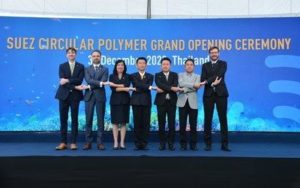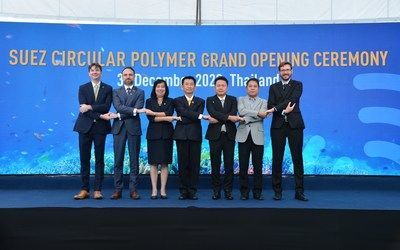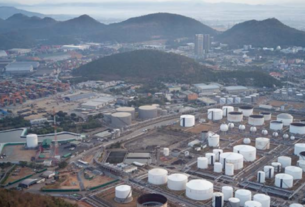
First SUEZ plastic recycling plant in Asia dedicated to reversing plastic pollution crisis and mitigating climate change opens in Bang Phli, Thailand
SUEZ today announced the official opening of the SUEZ Circular Polymer Plant in Bang Phli, Thailand – the Group’s first plastic recycling plant in Asia. It underscores SUEZ’s ambition to commit to improving the environment and building a more sustainable society despite the unprecedented times we are in due to COVID-19. The plant converts 30,000 tonnes of Thailand’s plastic packaging waste a year into post-consumer recycled (PCR) plastic as a long-term solution to the plastic pollution crisis. It also has one of the highest water reuse rates for recycling plants in Thailand at 94%, and avoids 35,000 tonnes of greenhouse gas emissions annually, equivalent to planting 1.5 million trees.
The opening ceremony of SUEZ Circular Polymer Plant is marked by the presence of (from left) Jerome Le Borgne Southeast Asia Project Development Director Recycling and Recovery SUEZ; Olivier Richard, Embassy of France; Krittika Panprasert, Director of Tax Incentive Bureau, Thai Customs Department; Sumate Teeraniti, Deputy of Samutprakarn Province Governor; Sakchai Patiparnpreechavud, Vice President, Polyolefins and Vinyl Business, Chemicals Business, SCG; Amnuay Suwannarak, Director of Samutprakarn Industrial Works, Samutprakan Provincial Industrial Office; and David Bourge, General Manager of SUEZ Circular Polymer, in Bang Phli.
The world produces 300 million tonnes of plastic every year, and 50% of it is used as packaging. Globally, more than 8 million tonnes of plastic waste are dumped into the ocean[1], of which Southeast Asia is a major contributor. In Thailand, only about one quarter of its 2 million tonnes of plastic waste is recycled per year.
“We need to rethink the ways we use and treat plastic. While plastic brings convenience to our everyday lives, it comes with the alarming consequence of millions of tonnes of waste in our oceans, resulting in adverse environmental impact and health effect as well as resultant economic losses,” said Steve Clark, CEO of SUEZ Asia. “We call for a long-term approach and such solutions already exist in our communities today. We are excited to open the Group’s first plastic recycling facility outside of Europe that will help encourage Southeast Asia to transform towards a circular economy and reverse the tidal wave of plastic pollution crisis. We look forward to working closely with all actors of the plastics value chain to bring us closer to a plastic free ocean.”

The SUEZ Circular Polymer Plant recycles low-density polyethylene (LDPE) and linear low-density polyethylene (LLDPE) plastic. It is one of Thailand’s largest LDPE recycling plants and operates in the highest level of compliance. It is strongly supported by the experience of specialists from PLAST’lab®, SUEZ’s plastic laboratory originated from France, that allows the plant to qualify, characterise, measure and formulate new recycled plastics to fit customer’s specific needs.
Producing 1 tonne of recycled plastic saves 5 barrels of oil, which is equivalent to 1.6 tonnes of CO2. Each year, SUEZ processes nearly 400,000 tonnes of plastic waste in nine specialist facilities around the world and produces 150,000 tonnes of circular polymers.
SUEZ is a founding member of the international Alliance to End Plastic Waste, and part of Thailand’s Public Private Partnership for Sustainable Plastic and Waste Management (Thai PPP Plastics) to collaborate with stakeholders to help protect the ocean and conserve the environment.
[1] https://plasticoceans.org/the-facts/
About SUEZ:
Since the end of the 19th century, SUEZ has built expertise aimed at helping people to constantly improve their quality of life by protecting their health and supporting economic growth. With an active presence on five continents, SUEZ and its 90,000 employees strive to preserve our environment’s natural capital: water, soil, and air. SUEZ provides innovative and resilient solutions in water management, waste recovery, site remediation and air treatment, optimising municipalities’ and industries’ resource management through “smart” cities and improving their environmental and economic performance. The Group delivers sanitation services to 64 million people and produces 7.1 billion m3 of drinking water. SUEZ is also a contributor to economic growth, with more than 200,000 jobs created directly and indirectly on an annual basis, and a provider of new resources, with 4.2 million tonnes of secondary raw materials produced. By 2030, the Group is targeting 100% sustainable solutions, with a positive impact on our environment, health and climate. SUEZ generated total revenue of €18.0 billion in 2019.
About SUEZ Asia:
With a strong presence of 60+ years in South East Asia and 40+ years in Greater China, SUEZ is a preferred partner in helping authorities and industrial clients develop water and waste management solutions that enable cities and industries to optimize their resource management and strengthen their environment and economic performances. With 9,000+ employees and 70+ joint ventures with local partners, the Group has built 600+ water and wastewater plants, with 32+ million people benefiting from our water and waste services. Today, SUEZ is recognized as one of the most influential companies and a service benchmark in leading the region’s environmental industry. We operate China’s first PPP water contract in Macau, one of Asia’s largest hazardous waste treatment facilities in Shanghai, as well as a plastic recycling plant in Thailand. It is also a leader in Hong Kong’s waste management industry and delivers environmental services to 21 industrial parks.
Find out more about SUEZ Asia on our website & social media: LinkedIn: SUEZ Asia, Twitter: @suezASIA


